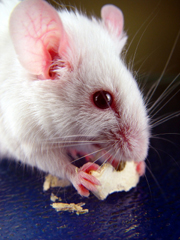 I love potato chips. There’s something very satisfying about the crunch of a good chip. The problem with chips, other than the obvious effect they have on my waistline, is that I can’t eat just one. Neither can my husband, who loves to open a bag of potato chips while I’m preparing dinner! To explain the disappearance of the potato chips, we joke that the chip-eating culprit in our house is not my husband but a giant mouse that has developed a taste for salty snacks.
I love potato chips. There’s something very satisfying about the crunch of a good chip. The problem with chips, other than the obvious effect they have on my waistline, is that I can’t eat just one. Neither can my husband, who loves to open a bag of potato chips while I’m preparing dinner! To explain the disappearance of the potato chips, we joke that the chip-eating culprit in our house is not my husband but a giant mouse that has developed a taste for salty snacks.
Recent research presented by Tobias Hoch at a meeting of the American Chemical Society shows that not only do rodents love potato chips but that this attraction may not be due solely to the high ratio of fats and carbohydrates, which is one proposed explanation for the “bet you can’t eat just one” phenomenon. There is something else that makes potato chips irresistible. Continue reading “Science Confirms What We’ve Always Suspected: Potato Chips are Irresistible”
